|
C. A. ALVORD
ELECTROTYPER AND PRINTER
――――♦――――
A TALE OF THE WOODS
IN FOUR ACTS
AND IN VERSE.
――――――
ACT I.
THE WAKING OF SPRING
ACT II.
THE LIFE OF THE BIRDS
ACT III.
THE IMPRISONMENT
ACT IV.
THE RELEASE
――――♦――――
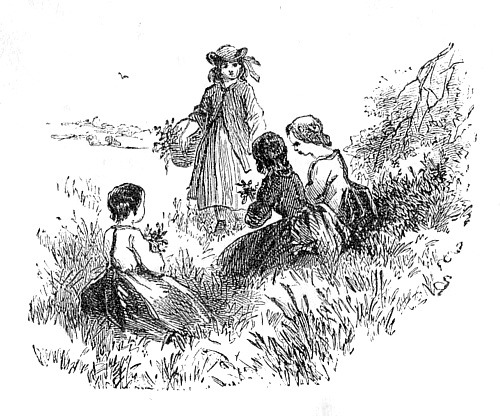
THE WAKING OF SPRING.
|
FIRST ACT.
____________
FIRST SCENE.
THE SNOWDROP.
IT was the sun,
my mother, spoke,
In the darksome night,
With gentle voice—yet I awoke,
Out of slumbers light;
Out of dreams which were so bright,
Of lovely flowers in bloom,
And little singing birds in sight,
As if the Spring had come.
But now my lovely dream is o'er,
And I am all alone once more,—
Beneath this heavy snow and ice
My little head so heavy lies;
Will it ever wholly rise?
THE VIOLET.
I hear a rustling sound hard by,
I'll just peep out and see,—
Behold, my sister Snowdrop stands
And whispers soft to me!
I must in bed no longer stay,
But haste to meet her in the way.
SNOWDROP.
So early, sister Violet?
All others slumber soundly yet.
VIOLET.
They may have been more tired than we,
Let them enjoy their peaceful rest;
The fitting time for them to wake,
The sun, our mother, knoweth best.
SNOWDROP.
Our sister Daffodil, but see,
Hath lifted up her golden head!
And fain to be with you and me,
Would leave her cosy little bed.
DAFFODIL.
Hardly a minute 'twas ago,
Our mother stooped and kissed my brow—
So tenderly, yet I awoke,
And heard the last words that you spoke.
THE SUN.
My little children, all arise,
And open wide your little eyes;
Icy Winter now is past,
And sunny Spring returns at last.
Valley lilies, spotless white,
Hyacinths and tulips bright,
Primroses so fair and meek,
Listen to the words I speak;
Green night-dresses cast away,
Put on garments for the day:
Be happy as the birds of air,
I will give you love and care.
Cornflowers, make the Earth look gay,
Its holiday begins to-day.
Leaves, array the woods in green,
Already are the swallows seen!
Cherry-trees, bloom out in white;
Ye larks, sing up to heaven's height;
Frisk, little Froggies, in the rills;
Fly, Butterflies, across the hills;
Cockchafers, buzz amid the trees;
Begin to work, ye little Bees!
Come, all ye little children, come,
Come out into the woods, and sing!
See what a lovely world it is,
Praise its Creator, Maker, King!
SONG OF THE CHILDREN IN THE WOOD.
Ye little, lovely, tender flowers,
Who made ye all so bright,
That ye should give our hearts and eyes
Such deep and pure delight?
THE FLOWERS.
And who to you, ye children, gave
Your eyesight fine and clear,
That ye can come, with merry hearts,
And view us blooming here?
THE CHILDREN.
The great good God did give us that,
Our Father up in Heaven;
By Him we're kept from every harm,
From Him all joys are given.
THE FLOWERS.
The same great God, who gave you eyes,
And fills your hearts with mirth,
Hath placed us here, to bloom in joy
Upon His beauteous Earth.
THE CHILDREN.
Oh! every thing says plain and clear.
"He hath created me,
The same great God, who rules in love
Far over land and sea."
How great, how wonderful art Thou,
O God, who reigns above!
To Thee we lift our little hearts,
In gratitude and love! |
____________
|
SECOND SCENE.
LITTLE BIRD RED.
Never before, little Bird Blue,
Have I seen a bird of such lovely hue.
LITTLE BIRD BLUE.
Little Bird Red, in my own countrie,
Never a Birdie Red you see.
LITTLE BIRD RED.
I am quite a stranger here,
Therefore, little Birdie, tell,
Are there many Blue Birds here?
For your look has pleased me well. |
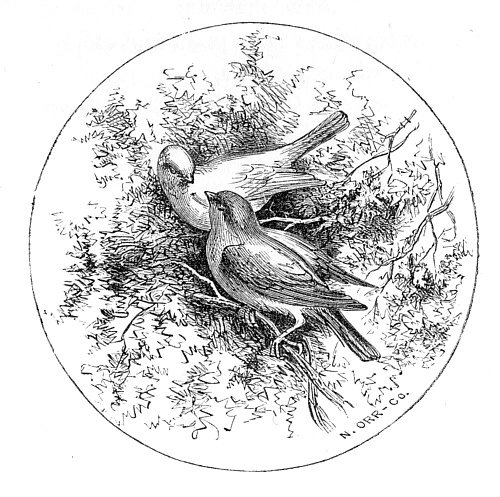
|
LITTLE BIRD BLUE.
So blue as I am, there are none,
But once I was not thus alone;
I had two little sisters fair,
A father's and a mother's care:
The Griffin Bird—that cruel thief—
Caused all my loneliness and grief,
For one day, ere we saw him come,
He darted down upon our home,
And in each savage claw seized two,
And ate them up before my view;
He could not carry more away,
Or I should not be here to-day.
LITTLE BIRD RED.
Poor little Bird! thou grievest me.
And yet 'tis well he slew not thee.
LITTLE BIRD BLUE.
Alas! I wish I too were gone,
It is so hard to live alone!
True, I have little friends, with whom
I sing and chirp now Spring is come;
But still I never can forget,
My parents' and my sisters' fate;
Without them, I so timid feel,
The hours so slowly, sadly steal!
And when the weary day is past,
And quiet night hath come at last—
When all the birds fly home to rest,
I seek my little lonely nest.
Alas! it is so lone and sad,
So unlike what it used to be,
As if it could not be the one,
Which formerly belonged to me!
LITTLE BIRD RED.
Poor little Bird, how sad thou art!
Thy tale of grief hath touched my heart!
I can feel for thee, for I, too,
A darling little sister knew.
We loved each other—oh, so well!
And always would together dwell;
From hedge to hedge, from tree to tree,
She flew the livelong day with me.
Then came the Winter cold and drear,
Making the woods so brown and sere;
Together we all went away,
To seek a home until the May;
By day, by night, towards the sun,
With little rest, we hurried on,—
When suddenly my sister grew
So ill, she could no farther go,
But sad and sorrowful, she sank
Upon a sunny cactus bank;
And, drooping low her little head,
She could not swallow drink or bread,
But looking forward, kept quite still,
And, ere I thought, was dead and chill
There, far away o'er land and wave,
I made my little sister's grave.
LITTLE BIRD BLUE.
Poor little Bird! it makes me sad,
To think her life had such an end;
It would have made my heart so glad,
Could she have been my little friend.
But well it is that you remain,
To greet the rising Spring again.
LITTLE BIRD RED.
What use is health and strength to one,
Who must go home to live alone?
For now the hands of Spring are seen,
Decking the meadows out in green,—
But who will help to build my nest,
To choose the spot I love the best?
LITTLE BIRD BLUE.
Dear little Bird, why go away?
Will you not here consent to stay?
I know a nook, so snug and warm,
So safe from every schoolboy's harm;
There you can build a cosy nest,
And I to help will do my best.
LITTLE BIRD RED.
When the flowers are all in bloom,
Then must I be going home;
But so dear art thou to me,
That I cannot part from thee.
Dear little Bird, thy pretty dress,
Has pleased me much, I must confess;
But thy eyes, so bright and clear,
Are a thousand times more dear.
LITTLE BIRD BLUE.
Rosy Red Bird, why gaze on me,
As if my inmost thoughts to see?
LITTLE BIRD RED.
Loved little Bird, so pretty and blue,
The love of my heart is all for you;
Will you marry me, and become
The dear little mistress of my home?
LITTLE BIRD BLUE.
Blue little women, they oft tell me,
To blue little men should wedded be.
LITTLE BIRD RED.
With those whose love is tender and true,
Such as my love is now for you,
No matter what their country and hue.
LITTLE BIRD BLUE.
Till now, of all the birds I've met,
I've never loved one truly yet.
Fly home—and I will follow thee,
Where thou art, ever will I be;
And so, in love and sweet content,
Together shall our lives be spent.
Over the meadow gayly flew,
The Red Bird and his mate so blue;
Far over land and sea they sped,
With merry sunshine overhead,
And now and then, in the heat of day,
They sang as they rested on their way.
So, many and many a day was passed,
Till sweet, sweet home was reached at last. |
____________
|
THIRD SCENE.
ANNIE IN THE GARDEN.
How warm and pleasant 'tis to-day!
Now we can go abroad and play:
What, Snowdrops, are ye out so soon?
And do ye know that Winter's gone?
Like little brides, so white and fair,
Ye stand in modest beauty there,
And lonely—but the sun will send
To each one soon a little friend;
For see, no sooner does she rise,
Than all the flowers ope their eyes.
Oh! with what joy and sprightliness
Each one puts on her summer dress!
Already in what bright array
Of blossoms are the borders gay;
As if a miracle had done
The work of many days in one.
ROSE.
Ah! sister Annie, art thou here?
I have looked for thee far and near.
ANNIE.
See, Rosy, yon small snowdrop head.
ROSE.
And are there any in my bed?
She goes towards her bed.
Oh! Annie, hasten, here are more,
By ten times, than your little store;
And can I really trust my eyes?
Here in the shade a violet lies;
And look, oh, look! scattered about,
A troop of daffodils peep out;
Green leaves the half-shut buds enclose,
As if each were a little rose.
ANNIE.
If little Roses, they must be,
Surely, my sisters that you see.
ROSE.
And you shall have a flower-name too—
A little Snowdrop I'll call you.
ANNIE.
And as the flowers together cling,
Through winter, autumn, summer, spring,
Kissing each other's tears away,
And live in peace the livelong day;
So let us hold each other dear,
And live united all the year.
ROSE.
But flowers, though made so fair to see,
Can't love, I'm sure, so well as we.
ANNIE.
Mamma so loves the pretty flowers,
We'll pluck for her the best of ours.
ROSE.
I'll pluck the loveliest I can get.
ANNIE.
And I, each purple violet,
And every golden primrose too,
For dear Mamma, who loves them so.
ROSE.
We have enough—come, let us see
Who gets in first—off! one—two—three! |
――――♦――――
THE LIFE OF THE BIRDS.
|
SECOND ACT.
____________
FIRST SCENE.
LITTLE BIRD RED.
HERE at last
we've safely come,
To my own old garden home;
Choose, little mate, which spot is best,
In which to build our cosy nest.
Suppose we take a high oak tree,
Too high for sharp-eyed cats to see?
LITTLE BIRD BLUE.
Dear little Bird, build not too high,
Or if the Griffin doth espy,
We both of us should surely die.
LITTLE BIRD RED.
Then to the beechen wood we'll go,
And seek a spot secure and low.
They sing together.
Little Birdies, near and far,
Where the pleasant copses are,
Gleefully we fly about,
And singing, flutter in and out;
We shall take no time for rest,
Till we've made our little nest,
So we search throughout the day,
For downy feathers, straw, and hay.
And when, at last, the nest is made,
And all the little eggs are laid,
We watch and brood, loving and gay,
All through the fresh and sunny day
And when the sun is gone to rest,
And golden stars shine in our nest,
Then we sleep secure and warm,
For angels keep us all from harm. |
|
____________
SECOND SCENE.
FIRST FROGGY.
Huzza! Winter's past!
SECOND FROGGY.
Huzza! Spring at last!
THIRD FROGGY.
Old Winter is gone.
FOURTH FROGGY.
Let us bask in the sun.
OLD FROG.
How inquisitive all the young folks grow,
They are out already above the snow!
TOAD.
Thou stupid old fellow, dost thou not see,
As I toss up my head, the sun shine on me?
OLD FROG.
Indeed! is it true?—and do the birds sing?
I, too, must jump up, if it really is Spring!
EIDER-DOWN DUCK.
How pleasant it is to glide through the grass,
And bibble the dew-drops as I pass!
FISH
(Popping its head out of the water).
Sure 'tis the noonday sun I felt below.
TOAD.
You stupid creature—what do fishes know?
FISH.
When the trees bud, and birds begin to shout,
Even we fishes know what 'tis about.
FLIES.
We buzz in the sunshine, and find life so sweet,
If only the birds did not want us to eat!
GNATS.
Hither and thither we dance in the light,
Ever ready to sting, ever ready to bite,—
No matter whether a beast or a man,
Though we know they will kill us as soon as they can.
OLD SPARROW.
Come hither, ye sparrows, and let's chat together.
SECOND SPARROW.
Ah! cousin, there's nought to speak of but the weather.
THIRD SPARROW.
Wisely spoken, dear uncle, there's no news to tell. |
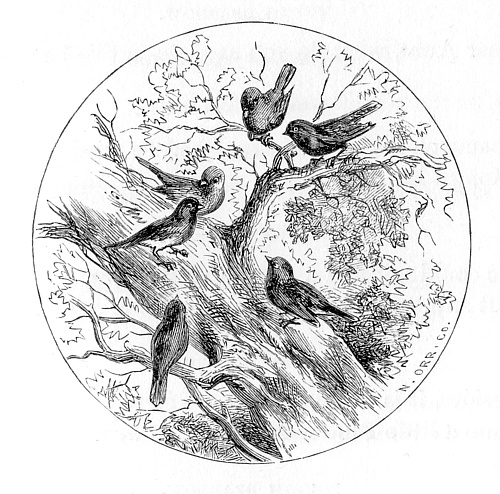
|
FOURTH SPARROW.
Of course not—the reason I know very well—
If birds keep at home till the end of their days,
How can they know much of the world and its ways?
But here comes our Aunt, who has travelled abroad;
I've no doubt, with wonders her mind is well stored.
AUNT SPARROW.
Well met, old friends and neighbours! how d'ye do?
I've got a little piece of news for you,—
I never was surprised so in my life,
Little Bird Red has got a foreign wife;—
And what's more strange, from head to foot she's blue!
YOUNG SPARROW.
Dear Aunt, what do you say?—can this be true?
THIRD SPARROW.
Shame on his impoliteness! had he tried,
'Mongst his own kin, he could have found a bride.
FOURTH SPARROW.
He could not find a wife so pretty here,
But still, to take a stranger does look queer.
SECOND SPARROW.
Besides, it is not right that one so red,
Unto a little Blue Bird should be wed.
FOURTH SPARROW.
Now tell me, is she really pretty, Aunt?
FIFTH SPARROW.
Some think her so, but I confess I can't.
SIXTH SPARROW.
Who will go with me to the wedded pair?
ALL.
Off to the woods we fly—their home is there. |
|
____________
THIRD
SCENE.
LARK.
Every bud bursts into bloom,
Every flower sheds sweet perfume;
Birds fly gladly through the air,
The joy of Spring is everywhere.
Let old and young, let great and small,
Rejoice in Him who sends us all.
LINNET.
In the sunshine, in the shadow,
In the wood, and in the meadow,
All around glad voices sing,
"Be joyful in the pleasant Spring."
HEDGE-SPARROW.
Gladsome echoes seem to fill
Every valley, every hill.
ROBIN REDBREAST.
In one great chorus, all proclaim
The might of the Creator's name.
GREENFINCH.
Even the wee ones, in their nest,
Praise God before they go to rest.
BEE.
We little bees are busy ever,
From making honey resting never.
BUTTERFLY.
Our life is short, but full of joy.
ANT.
We ants each moment must employ,
In bearing earth from every mound,
To build a house with, underground.
FIRST COCKCHAFER.
Such humming, buzzing all the day!
Enough to drive one's wits away.
SECOND COCKCHAFER.
You'll not much help, by grumbling so,
All the work you have to do.
ROBIN REDBREAST.
Dear little Swallow, tell, I pray—
Under the shadow of the eaves
Why dost thou build, so far away,
When we build always 'midst green leaves?
SWALLOW.
Beneath a roof, we're snug and warm,
And safe from every thunder-storm.
HEDGE-SPARROW.
Little Bird Red, early and late,
Seeks food for himself and pretty mate.
LINNET.
Ne'er has it been my fate to see
A Bird so beautiful as she;
Her feathers are so shining blue,
And then she sings so sweetly too,
Such tuneful notes, I've never heard.
Little Bird Red flies past.
LINNET.
What! hast thou not one little word
To give thy old friend by the way?
LITTLE BIRD RED.
Ah! friend, just now I cannot stay;
Alone at home, my little mate
So anxiously for me doth wait;
Five little eggs already there
She broods upon with tender care.
Farewell! I have no chatting leisure,
And without her can take no pleasure.
SWALLOW.
Fly away—we too will haste,
Each one to his little nest.
|
――――♦――――
|
THE IMPRISONMENT.
THIRD ACT.
____________
FIRST SCENE.
FIRST YOUNG BIRD.
SEE, my feathers
are so strong,
I shall learn to fly ere long,
Over hill and vale and mead,
What a pleasant life I'll lead!
LITTLE BIRD BLUE.
You must wait a few days longer,
Till your wings are somewhat stronger;
Then you shall fly from tree to tree,
But not at first lose sight of me.
SECOND YOUNG BIRD.
In every tree will I be seen,
Flying 'mid the leaves so green.
THIRD YOUNG BIRD.
I'll find out berries red and sweet,
To earn myself each meal I eat.
FOURTH YOUNG BIRD.
How bright and blue my feathers are!
I'm glad to be so like Mamma!
SECOND.
And I, like dear Papa, am red,
With a small tuft upon my head.
FIRST.
Papa went out into the wood,
To find us berries if he could.
SECOND.
How long will he be gone, Mamma?
THIRD.
Ah! here you are—you good Papa!
FIRST.
Papa has thought of us, I see,
And brings us berries home for tea.
LITTLE BIRD RED.
Here is a treat for every one;
Now eat away till all are done.
I stay with you, whilst mother dear
Can fly amid the thicket near;
She'll like, I know, to flit about,
And find the fresh wild strawberries out.
LITTLE BIRD BLUE.
Farewell! I'll bring you home the best,
And soon be back, to go to rest. |
____________
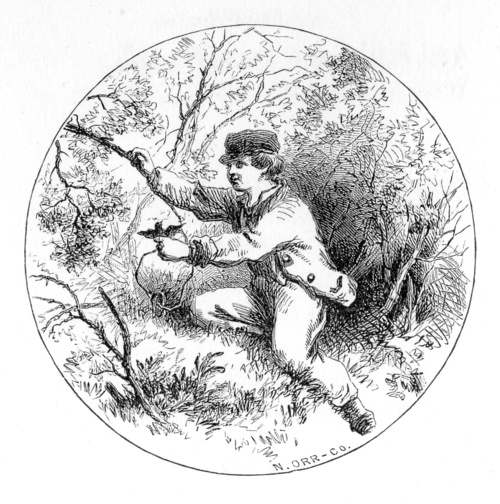
|
SECOND SCENE.
SWALLOW.
O grief! what have I lived to see?
ROBIN.
Speak out—what has befallen thee?
SWALLOW.
Some cruel boy a snare has laid,
Little Bird Blue is prisoner made.
LINNET.
You see that boy who's running there—
'Tis he who took her from the snare.
HEDGE-SPARROW.
Alas! what will her husband do,
Without his little helpmate Blue?
SWALLOW.
How the poor little ones will cry!
GREENFINCH.
And she, I fear, will surely die.
ROBIN.
Ah! that such misery should befall
Her, who was loved so by us all!
WREN.
Alas! how heartless they must be,
Who will not leave us safe and free;
Our children, mate, and happy nest,
All that a little bird loves best.
Little Bird Red appears in the distance, coming
from the wood.
Robin flies towards him.
ROBIN.
Alas! poor friend, we weep to see
The sorrow that has come to thee!
We fear thou'lt never, never find
Thy little wife, so good and kind,
For down among the hazels there
She has been taken in a snare.
LITTLE BIRD RED.
A snare! Oh! tell me 'tis not true—
My heart would break of such a woe.
SWALLOW.
Ah! friend, I know it but too well
'Tis hard to have such news to tell.
The boy who caught her from the trap,
Took her to town hid in his cap.
LITTLE BIRD RED.
O bitter grief!—O misery!
Why have I lived this day to see?
My joy, my pride, my darling wife,
The sweet companion of my life,
Must she no longer, free and gay,
Through the green forest wing her way
And shall I never see thee more,
Or hear thee warbling at our door?
What joy can glades or cornfields give,
If thou, my mate, hast ceased to live?
And oh! my little lovely brood,
Who watch for mother in the wood,
How will ye cry, and cry in vain,
To find she does not come again!
O bitter grief! O misery!
Why have I lived this day to see? |
____________
|
THIRD SCENE.
Little Rose appears at the window with a cage
containing
Little Bird Blue.
ROSE.
As happy as a little Queen,
'Midst vines that cluster cool and green,
And flowers that pleasant fragrance give,
My pretty Bird shall always live.
Ah! do not hang thy little head,
There's nothing now to make thee dread;
The cruel boy is gone away,
Who only took thee for his play;
But thou art dearer for to me,
And I will feed and wait on thee.
My Birdie, wilt thou not, ere long,
Sing me one little grateful swig?
And, by-and-by, be kind, and eat
Out of my hand the grains of wheat?
She goes out. Little Bird Red comes flying to the
window.
LITTLE BIRD RED.
Oh! little helpmate, do I see,
Or only dream, that it is thee?
My heart beats high with joy and pain,
I feared we ne'er should meet again.
LITTLE BIRD BLUE.
Alas! my husband, and I, too,
Have had no hope to cheer my woe;
But now captivity will be
Easy to bear, since cheered by thee.
LITTLE BIRD RED.
Oh! that I had the strength of those,
Whom, though we hurt not, are our foes,
Then would I break the bars in twain—
What joy to take thee home again!
LITTLE BIRD BLUE.
My helpless birdlings, how are they?
And did they weep much yesterday?
Ah! would that I had never flown,
So far away by night, alone!
But just below the shady yew,
Such tempting purple berries grew,
I could not help from picking some,
To take the little birdlings home;
But whilst I plucked so gayly there,
I stepped upon the fatal snare.
I tried to fly—till, weak and worn,
With one poor leg all hurt and torn,
I fell despairing on the ground,
And there by some rude boy was found. |
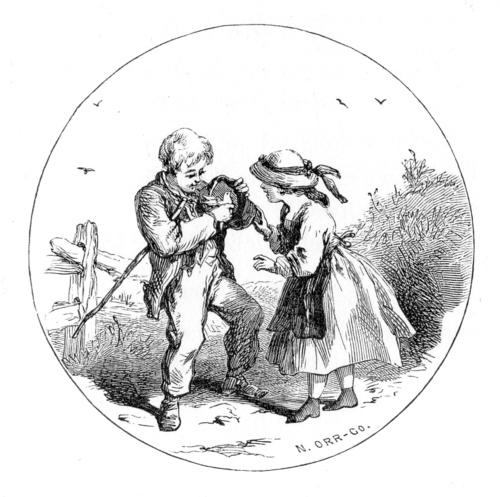
|
LITTLE BIRD RED.
And was it he who brought thee here?
LITTLE BIRD BLUE.
Oh, no; a little girl was near,
Who bought me of that tyrant boy,
And took me home with pride and joy;
'Twas she who kindly placed me here,
I trembling every limb with fear.
LITTLE BIRD RED.
Poor little prisoned mate of mine,
Would I could change my lot with thine!
LITTLE BIRD BLUE.
Ah! weep not for me, husband dear,
Go home, our little ones to cheer;
The sun already sinks to rest,
They will feel lonely in the nest;
Oh! haste, or some fierce bird may stray,
And eat them up, whilst thou'rt away.
Tell them they must no longer weep,
But patiently take rest and sleep.
Farewell! I, too, will try and close
My eyes, and dream away my woes.
LITTLE BIRD RED.
Farewell! forget thy grief and pain;
Soon shalt thou see me here again! |
____________
|
FOURTH SCENE.
LITTLE BIRD BLUE.
When all the world is gone to rest,
And, in its happy, peaceful nest,
Each little bird doth peaceful sleep,
I sit alone, and sadly weep.
My little mate, my children dear,
Oh! why must I be exiled here?
So hopeless is my misery,
That I could almost gladly die.
Alas! will no one pity me,
And break my bars, and set me free?
I cry in vain—no help is near,
And I must die, a prisoner here.
NIGHTINGALE IN THE SHRUBBERY.
I hear a sad sweet song below,
Sure 'tis some prisoner's note of woe.
LITTLE BIRD BLUE.
Ah! what sweet strains respond to mine?
Sweet little Bird, do you too pine,
Away from all the ones you love?
NIGHTINGALE.
Ah! no, I still in freedom rove,
Though in the copse I love to stay,
And sing the evening hours away.
Nightingale sits under the window.
LITTLE BIRD BLUE.
But, tell me, little Bird, I pray,
Why sing by night instead of day?
Or has my bitter song of woes
Broken your tranquil night's repose?
NIGHTINGALE.
Because my voice is never heard
By day, like that of every bird,
But only when night's shadows veil
The earth—I'm called the Nightingale.
If in some chamber still and dim,
A sick man lies, I sing to him;
Or if some heart is bowed with grief,
I sing till tears bring sweet relief;
Many and many a one in woe
I've soothed to rest and comfort so.
LITTLE BIRD BLUE.
All that I once in joy possessed—
My children, mate, and little nest—
The love so sweet, the life so free,
Forever now are lost to me.
Ah! how the dark and solemn night
Fills me with sadness and affright!
But, could I ever listen so,
Unto thy singing, sweet and low,
My grief, I think, would almost wane,
And peace come to my heart again.
NIGHTINGALE'S SONG.
Sad heart, I bring thee
A balm for thy woes;
Softly I sing thee
To sweetest repose.
The little ones sleeping,
Dream in their snug beds;
Kind angels keeping
Watch over their heads.
No breeze is shaking
The leaves on the bough,
The winds even taking
Their holiday now.
Cast off thy sorrow,
Take rest, weary heart;
Perhaps on the morrow
Thy grief may depart! |
――――♦――――
|
THE RELEASE.
FOURTH ACT.
____________
FIRST SCENE.
Little Bird Red comes toward the window,
bringing wild flowers in its beak.
AH! sleep little
mate,
Guarded by me;
Early and late
Watch I by thee.
Wild flowers I bear thee,
From thy loved wood,
That they may cheer thee
In thy sad mood.
Their perfume shall greet thee
Like a dear voice,
Recalling so sweetly
Old woodland joys.
From thy children and mate,
They say unto thee,
Have patience, and wait—
Thou shalt be free!" |
____________
|
SECOND SCENE.
Little Bird Blue wakes up.
Ah me! how sweetly I have dreamed,
Just like reality it seemed;
Forgotten was my grief and pain,
I was at home and free again.
Alas! I wake, the joy is gone,
And I am here with grief alone!
WILD FLOWERS.
Children of the woods are we,
Bringing messages to thee;
From thy mate and children dear
Have we come, to see thee here.
MAY-BELLS.
Little silver bells are we,
Ringing morning chimes to thee.
Canst thou not come out, and dwell
In the woods thou lov'st so well?
WILD ROSES.
Beautiful though roses are,
Love is nobler, better far.
FORGET-ME-NOT.
Clear and deep as heaven's blue,
Friendship should be pure and true.
PRIMROSE.
We yellow flowers, like stars of gold,
Declare God's kingdoms manifold.
IVY.
We green leaves are never sere,
But are fresh throughout the year;
Thus we're made by God to show,
Hope should ever flourish so.
Soon the forest-leaves will fall—
Hope is always left to all.
LITTLE BIRD BLUE.
Who brought ye here, ye pretty flowers,
Friends of my former happy hours?
WILD FLOWERS.
Your mate has brought us from the wood,
To cheer your prison's solitude. |
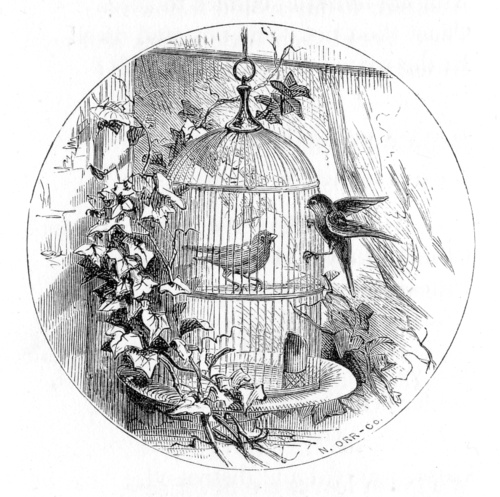
|
LITTLE BIRD BLUE.
Little Bird Red—ah! could it be,
He came, and never wakened me?
Oh! can I trust my weary eyes,
Ah! yes, 'tis he who hither flies.
My grief and woe I feel no more,
I never loved him so before.
Oh! husband, quickly, quickly tell—
My children, are they safe and well?
LITTLE BIRD RED.
Thy little ones cry still for thee,
And fain to-day would follow me;
They spread their little wings, and try
Already from the nest to fly;
For me—I feel no grief or pain,
When I my darling see again.
LITTLE BIRD BLUE.
Ah! last night how I sighed and wept!
I think I never should have slept,
Unless the gentle nightingale,
Hearing the lonely prisoner's wail,
Had soothed me with her sweetest strain,
Into forgetfulness of pain.
LITTLE BIRD RED.
I also, wakeful and distressed,
Could take no happy sleep or rest.
Alas! that cruel men should come,
And spoil our little happy home!
No sooner dawned the morning red,
Than I to thee have straightway sped.
LITTLE BIRD BLUE.
My little mistress means it well,
But, oh! if she could only tell,
How very hard it is to me,
When all the other birds are free,
In prison-house so close and drear,
To pine alone and wretched here,—
Could she but know the bitter pain,
With which a mother yearns to see,
Her little children once again,
I know—I feel—she'd set me free!
Alas! our wrongs we cannot speak,
Although our little hearts should break.
LITTLE BIRD RED.
Ah! could she only know my pain,
To hear our birdlings cry in vain,
To be divided from my wife,
And miss each happiness of life;
Could she but feel for you and me,
To-day, I know, she'd set you free.
But birds may supplicate all day,
Man understands not what they say.
LITTLE BIRD BLUE.
Yes, could she feel with us, I know,
She'd ope the door, and let me go.
LITTLE BIRD RED.
A sudden thought has passed my brain,
The woods shall see you free again.
I'll try, at least, the best I can,
To carry out my happy plan.
LITTLE BIRD BLUE.
What new idea has made him go
Towards the wood, and leave me so?
LITTLE BIRD RED.
At the Skirt of the Wood.
All ye birds in field and dale,
All ye birds in wood and vale,
Hither come, and work with me,
To set my little prisoner free.
Birds fly from the Wood.
BIRDS.
Willingly, from far and near,
To assist we gather here.
LITTLE BIRD RED.
At the bars gnaw hard and fast,
They will come apart at last.
SWALLOW.
All our biting is in vain,
Iron will not break in twain.
ROBIN REDBREAST.
Poor little Bird! and must it be,
That all our help can't set thee free?
LITTLE BIRD BLUE.
Alas! 'tis pity you should take,
Dear friends, such trouble for my sake.
The staves are far too hard to split,
You never can succeed in it.
BIRDS.
No, we will daily use our strength,
Surely we shall succeed at length;
Steadfast love and patience are
Even match for iron bar. |
____________
|
THIRD SCENE.
LITTLE BIRD BLUE.
Weary, darksome night is past,
Day and sunshine come at last.
Alas! eight days, so long and drear,
I've languished now in prison here;
But every morning comes my mate,
To cheer my melancholy fate,
And all his comrades brave and strong
Who work for me the whole day long.
But do I dream?—or really see
My children flying here to me?
FIRST YOUNG BIRD.
Ah! mother, we have flown so fast,
And here we come to thee at last!
SECOND.
How long it is since that sad day,
They took thee from us quite away!
THIRD.
But now we can be glad at heart,
Since we need never from thee part.
FOURTH.
What joy to speak to thee once more!
I never felt so glad before.
LITTLE BIRD BLUE.
My little ones, my pretty brood,
My nestlings from the dear old wood
To have you with me once again,
Makes me forget all former pain.
FIRST YOUNG BIRD.
And now we can fly everywhere;
SECOND.
And dart so gladly through the air;
THIRD.
And on the green boughs sit and swing;
FOURTH.
And little songs can also sing.
FIRST.
But till thou too art free and glad,
Even this life is partly sad.
Mother, we are so great and strong,
Oh! we shall make thee free ere long
LITTLE BIRD BLUE.
Thick iron bars to nibble through,
Is not an easy task to do.
SECOND YOUNG BIRD.
Ah! see this thread that ties the door—
A worsted thread, and nothing more.
THIRD.
I help—the task will soon be done.
FIRST.
I, too—huzza! the victory's won!
LITTLE BIRD RED.
The door is open—thou art free!
Oh! little mate, fly home with me.
ALL, WHILST THEY FLY AWAY.
Free, free, free—huzza!
Who so glad as free birds are! |
____________
|
FOURTH SCENE.
ROSE.
Dear Annie, I'm so glad you're come,
It seems so long since you left home;
And, oh! I've purchased—have you heard?
The dearest little singing-bird
It is so soft, so glossy blue,
I'm sure 'twill be a pet with you.
But come towards the window, dear,
Its little cage is hanging there.
The door is open!—can it be,
Some one has set my darling free?
ANNIE.
You fastened it—you feel quite sure?
ROSE.
Oh, yes! I made it quite secure.
It is but just an hour ago
Since I was here, and left it so.
ANNIE.
But, see! on yonder hazel bough
A small Blue Bird is sitting now.
ROSE.
Oh, little pet! oh, Birdie! say,
Why were you not content to stay?
You had a cage so large and high,
I fed you—oh! so carefully;
I petted you the whole day long,
And never yet one grateful song,
Or one glad look you've given me;
Yet, now that you are once more free.
You sit and chirp so blithe and gay—
Were you so glad to get away?
ANNIE.
But, Rosy, look! she's not alone,
Five other birds have hither flown:
Four pretty little new-fledged things,
And one Red Bird, who loudly sings.
ROSE.
One little Bird is blue and red,
With a black tuft upon its head.
ANNIE.
Ah! sure enough that it must be
Some little woodland family;
And now they sing in such glad strain,
To have the mother free again.
ROSE.
Ah! though I've lost my little treasure,
It would be wrong to grudge their pleasure.
ANNIE.
If dear Mamma imprisoned were,
Should we not pine and weep for her?
ROSE.
And she would die of grief, I know,
If she were parted from us so.
ANNIE.
But, see! the parents with their brood
Fly quickly to the beechen wood:
We'll softly follow in their trace,
Perhaps we'll find their hiding-place. |
____________
|
FIFTH SCENE.
In the Beechen Wood.
LITTLE BIRD RED.
Come, all ye birds, rejoice with me.
Join in my gladsome jubilee!
Little Bird Blue once more is come
Unto her own old happy home.
Oh, happy, careless woodland life!
Oh, little ones!—oh, darling wife!
I almost feel too blest to sing
And yet should all the forest ring
With joyful shout and jubilee—
The little prisoner is free!
CHORUS OF ALL THE BIRDS.
Happy days have come at last,
All the bitter ones are past;
Think no more of parting pain,
It shall never come again;
In the wood your life shall be
Glad, and innocent, and free.
Sing, ye birds, and shake your throats
With your gladdest, sweetest notes!
Let the glad exultant sound
Echo the whole forest round.
All the birds shall henceforth be,
Ever, ever, safe and free!
CHILDREN IN THE DISTANCE.
All the birds shall henceforth be,
Ever, ever, safe and free!
ECHO.
Free, free, free, FREE!! |
THE END.
|
